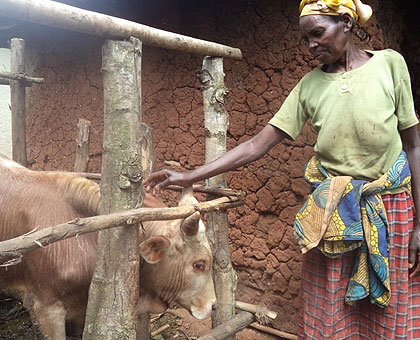AFTER the 1994 Genocide against the Tutsi, Cassien Hatungimana, 45, was left wondering what the future held, not because any of his relatives had been murdered or his belongings destroyed but his conscience was furrowed.


AFTER the 1994 Genocide against the Tutsi, Cassien Hatungimana, 45, was left wondering what the future held, not because any of his relatives had been murdered or his belongings destroyed but his conscience was furrowed.
The resident of the remote Nyamiyaga village in the rural Simbi Sector, Huye District, was part of a group of militiamen who took up traditional weapons and rummaged the area and its neighbourhood in hunt of Tutsi.
He says at the time of the killings and looting, he had no idea of the gravity of his acts.
"We had been blinded by the hate propaganda that we had been exposed to for years,” he says. "So, when some leaders encouraged us to kill our neighbours, we thought we were rendering a service to our nation.”
"With the Genocide, we helped reduce our country to ashes. Shortly after the Genocide was stopped, I thought it would be impossible to pick up life again,” Hatungimana says, expressing remorse for his role in the killings that claimed the lives of more than a million people.
"It was the worst thing we ever did to our country.”
Besides the economy that was left in tatters, Hatungimana was a firsthand witness to a total breakdown of the country’s social fabric.
"I couldn’t imagine living again with the people we had made orphans or widows,” he says. "For me it was impossible.”
When the Gacaca courts started a decade ago, Hatungimana pleaded guilty. He also apologised for his acts and sought forgiveness from his victims.
As a result, he was given a lenient sentence of 10 years, half of which were dedicated to the works of general interests.
About five years ago, Hatungimana joined a group that was created to bring together Genocide survivors, perpetrators and other community members with the aim of reconciling them.
The group, Inganzo y’Ubumwe n’Ubwiyunge (the throne of unity and reconciliation), was created with support from an NGO.
Cesarie Mukabutera, 62, a survivor who lost four sons and dozens of relatives in the Genocide, was among the first to join.
For years, she had struggled with the trauma left by the tragic events 20 years ago. She decided to join others in their quest for reconciliation, unity, healing and later improved living conditions.
"Our relations with those who had participated in the Genocide were really strained. We even feared each other,” she recalls.
But as efforts to bring the two sides together intensified, Mukabetera found herself face-to-face with the same people who butchered her family members and wanted her dead in 1994.
"At first, I couldn’t believe what was happening,” she says. "These were the people I couldn’t trust but as time moved, our fears were put to rest and mutual trust was restored.”
Paving way for growth
Mukabutera says her fears did not only affect her relations with her neighbours, but also weakened her ability to enhance her livelihood.
From their initial target of building a reconciled and united community, members of Inganzo y’Ubumwe n’Ubwiyunge also started an informal scheme to help one another with basic necessities.
Informal savings and credit groups (ibimina) were also created to help members grow. Mukabutera and 29 others found themselves in a group named ‘Girinka’ (or have a cow).
Currently, 28 of the 30 members in the group have received cows and the remaining two are set to acquire their animals soon.
Each month, every member contributes Rwf5,000 to the group. The pooled resources are used to purchase a cow for a member, one after the other.
"This initiative has been the driving force behind my journey to improved living conditions,” Mukabutera says, listing property and education of her two children as some of the achievements she has made.
"Had we not come together, reconciled and achieved unity, we wouldn’t have picked up the pieces.Reconciliation was not easy; there were sacrifices to be made. We had to put aside our dark past, sit together and openly discuss the way forward,” says Beatrice Kabagema, whose husband took part in the Genocide.
"These people have become family. They help me in whatever condition and whenever I need them and this keeps me going,” she adds.
For Hatungimana, reconciliation was "the great step forward towards reintegration into the community and socio-economic transformation of lives.”
"The future looks brighter,” he says as he strokes a cow in a shed outside his home. "I received this cow from the group, otherwise I would be wallowing in poverty today,” he says.
Kabagema, 67, says reconciliation and unity are pre-requisite to better living conditions.
"Without unity, we can’t live, or develop; we can’t build stronger communities,” she says.


